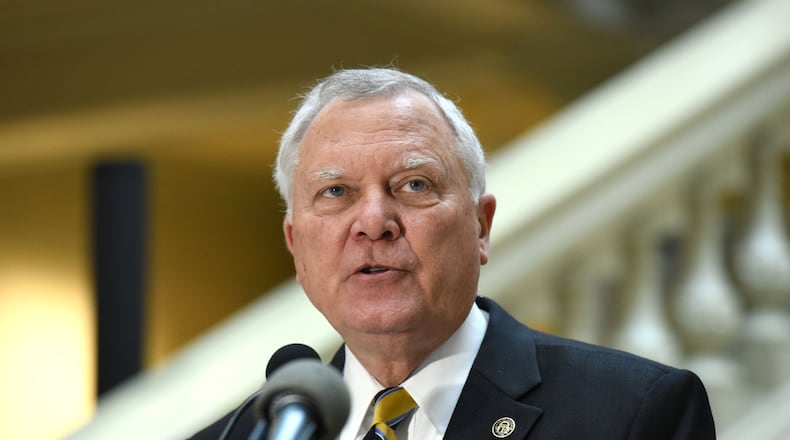The state's leading Republican activists are set to vote this weekend on a "religious liberty" resolution that tests the clout of the party's new leader and could have implications on the race for governor.
Among the raft of resolutions up for debate at Saturday’s meeting of the Georgia GOP state committee is a particularly juicy one: It would urge gubernatorial candidates to pledge they would support a state version of the Religious Freedom and Restoration Act if elected.
There are four GOP candidates in the race, but this seems aimed at Lt. Gov. Casey Cagle. He was an outspoken supporter of the legislation in 2016, but said this year it should be up to federal lawmakers to decide the issue.
The state party passed resolutions endorsing the "religious liberty" measure in 2015 and 2016, and party activists even panned Gov. Nathan Deal last year for his veto of the bill. But pushing candidates to sign a pledge to back the controversial measure goes too far for some Republicans.
There’s an active effort backed by allies of Georgia GOP chair John Watson, as well as a range of other GOP activists, to roll back this part of the resolution:
"If elected Governor, I will actively support the Legislature in its efforts to pass an uncompromised, state-level RFRA that mirrors the federal RFRA. I will sign such a bill if it passes, protecting First Amendment rights, particularly the Free Exercise of Religion."
Their argument: The Georgia GOP shouldn't be in the business of trying to impose a pledge on a candidate.
"While I do support a RFRA and I do support the state party issuing resolutions identifying its positions, I do not support the party issuing some sort of mandate that candidates sign a pledge," said Joseph Brannan, chair of the 2nd GOP District.
The supporters of the pledge are holding firm. Alex Johnson, a DeKalb attorney who has three times run for party chair, said the effort to remove the pledge wreaks of backroom shenanigans.
“We believe, at core, that politicians should keep their promises to voters,” he said. “And these efforts to remove the ‘pledge’ language make it seem that those in the paid political industry believe that politicians shouldn't be required to even make promises to be accountable to.”
The state party was supposed to put the finishing touches on the resolutions at its June convention, but lengthy delays meant there was no quorum when it came time to vote. That means the state committee members – there are more than 200 of them, including ex-officio types - will have the final say.
The "religious liberty" legislation has morphed over time, but supporters typically want Georgia to join the 21 other states that have similar laws they say will protect people of faith from government intrusion, as well as strengthen legal protections for opponents of gay marriage. It has long enjoyed enormous support among grassroots GOP conservatives.
The opponents, including powerful business boosters and gay rights groups, warn it amounts to legalized discrimination and point to executives from dozens of big-name companies, including Apple, Disney and Time Warner, who threatened boycotts and called on Deal to veto the bill.
The "religious liberty" debate has been a vexing one for Cagle. He enthusiastically supported the measure last year, and vowed that it had the support of a "silent majority" despite the governor's veto.
Cagle struck a different tone in the runup to this year's legislative session, arguing that the debate should be left up to Congress. And he said that President Donald Trump's victory sapped the need for new protections because he'll appoint conservatives to the U.S. Supreme Court - which is set to soon consider the argument.
His three GOP rivals have staked out their positions: State Sens. Hunter Hill and Michael Williams both voted for the measure last year, and Secretary of State Brian Kemp has been supportive of it as well.
It’s an early challenge for Watson, a lobbyist and former aide to Sonny Perdue who was elected in June to lead the party.
Brandon Phillips, a veteran GOP operative who is on the state committee, said if Watson can strike a compromise that embraces RFRA while “avoiding the slippery slope of making candidates sign pledges, he’ll have a victory that shows he can successfully lead the many factions of our party.”
About the Author
Keep Reading
The Latest
Featured




